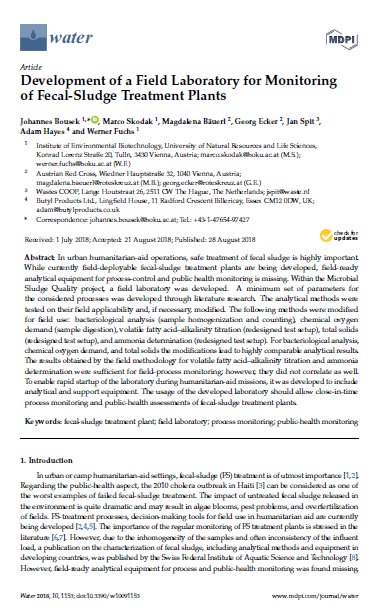Development of a Field Laboratory for Monitoring of Fecal-Sludge Treatment Plants
 |
rapport Aug 2018 ; 17 pages
Ed. Water 2017 -
Téléchargeable sous format: PdF
Téléchargeable chez l'éditeur
Abstract:
In urban humanitarian-aid operations, safe treatment of fecal sludge is highly important. While currently field-deployable fecal-sludge treatment plants are being developed, field-ready analytical equipment for process-control and public health monitoring is missing. Within the Microbial Sludge Quality project, a field laboratory was developed. A minimum set of parameters for the considered processes was developed through literature research. The analytical methods were tested on their field applicability and, if necessary, modified. The following methods were modified for field use: bacteriological analysis (sample homogenization and counting), chemical oxygen demand (sample digestion), volatile fatty acid–alkalinity titration (redesigned test setup), total solids (redesigned test setup), and ammonia determination (redesigned test setup). For bacteriological analysis, chemical oxygen demand, and total solids the modifications lead to highly comparable analytical results. The results obtained by the field methodology for volatile fatty acid–alkalinity titration and ammonia determination were sufficient for field-process monitoring; however, they did not correlate as well. To enable rapid startup of the laboratory during humanitarian-aid missions, it was developed to include analytical and support equipment. The usage of the developed laboratory should allow close-in-time process monitoring and public-health assessments of fecal-sludge treatment plants.
Public-Cible:
Mots clefs: |
boues (gestion des ) (CI) (DT) (OP) (ope) , boues (traitement des ) (CI) (DT) (OP) (ope) , conflit (CI) (DT) (OP) (ope) , humanitaire, urgentiste (CI) (DT) (OP) (ope) |
Editeur/Diffuseur: |
|
Water 2017 - - Etats Unis |
En cas de lien brisé, nous le mentionner à communication@pseau.org